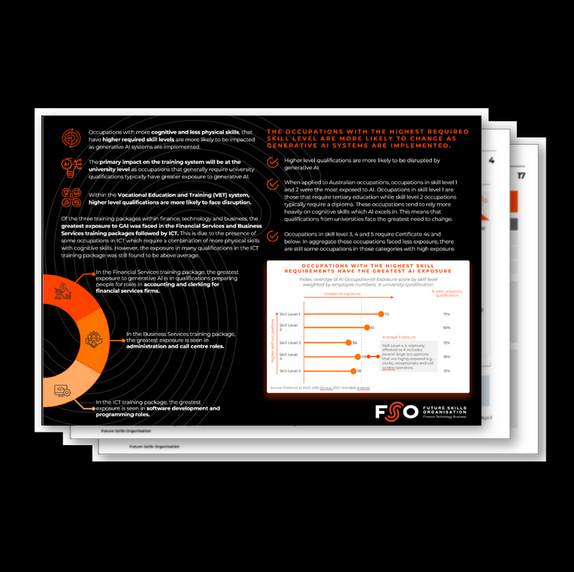
New report finds higher-level qualifications are more likely to be disrupted by generative AI
The Future Skills Organisation (FSO) has released a new report, ‘Impact of generative AI on skills in the workplace’, in partnership with Mandala Partners.
The report outlines the impact of generative AI on finance, technology and business occupations, and the ramifications this will have on the training system in Australia.
CEO of the Future Skills Organisation Patrick Kidd OBE OAM said he is excited by the opportunities this brings to the sector and the future of work.
“There’s no doubt that generative AI is having a significant impact on our world, including what we learn and how we train. This report is the first of its kind that examines the exposure of various training products to generative AI.”
The report found that occupations using more cognitive and sensory skills will be most impacted by generative AI, and those with physical skills will be least impacted.
The occupations with the highest required skill level are more likely to change with generative AI, as these occupations tend to rely more heavily on cognitive skills which AI excels in.
The primary impact on the training system will therefore be at the university level. Within the VET system, higher level qualifications such as graduate certificates and diplomas are more likely to face disruption.
Within the finance, technology and business training packages, the greatest exposure to generative AI was found in the Financial Services and Business Services training packages followed by ICT. The report found that the occupations facing the greatest exposure included human resources, accounting, banking and marketing and communications.
“We know that Australia’s finance, technology and business sectors are some of the most innovative, creative and resilient sectors. AI has the potential to establish new ways of conducting business, with tasks being automated, augmented or adapted, and ultimately shifting how we create, consume and engage with content.”
“While the opportunity to increase our productivity is clear, we should also expect some jobs to be fundamentally changed by AI. We need to plan now for how the workforce will transition so we can realise our potential in this environment,” Kidd said.
Leading economic research consulting firm Mandala Partners conducted the research with Director Tom McMahon recounting the methodology of the research.
“To determine the impact on Australia’s training system, and in particular VET, we mapped estimates of the impact on the human abilities that form the fundamental building blocks of tasks, skills and occupations. This allowed us to estimate the impacts at the occupation, qualification and unit of competency level.”
“To determine the unit of competency AI exposure score, we extracted the performance criteria of relevant FSO training packages, fed the data into the GPT-4 API with a custom system message to translate the criteria into abilities scored out of 10 for each unit of competency. We then sense-checked this using a statistical analysis and random checks returned by the language learning model ensuring they aligned with reasonable expectations.”
“We know that the impact of generative AI is being felt in workplaces right now, so analysing this impact is critical as the FSO works to close Australia’s skills gap across these sectors.”
“Roles spanning finance, technology and business, like banking, project management, accounting and software development are critical to the functioning and success of our economy. Ensuring we understand the exposure of AI in these fields will be crucial as the FSO look to close the skills gap and create a diverse and skilled workforce,” Mr McMahon said.
With Australia projected to have a 370,000 digital worker shortfall by 2026, according to the Growing Australia’s Digital Workforce report, these findings will be crucial in considering how to tailor the training system to meet demand.
“These findings allow us to more clearly understand the current and emerging influences and trends impacting the VET system, allowing us to equip training providers and students with the skills to harness this potential rather than be passive bystanders,” Kidd said.
“Ultimately, our core mission is to close the skills gap facing Australia’s finance, technology and business sectors. We want to ensure that we are doing everything we can to support all Australians with the skills to succeed for work, learning and life, and we must factor AI into our mission,” Mr Kidd said.

